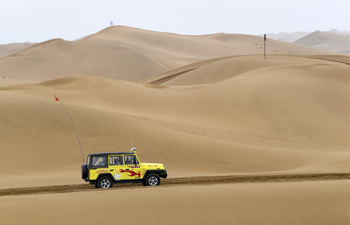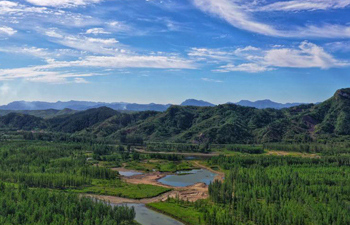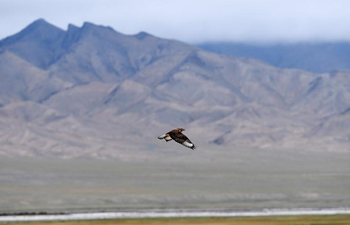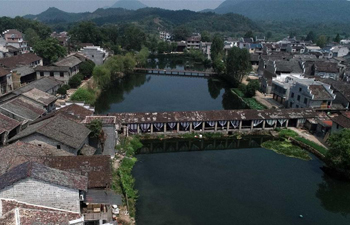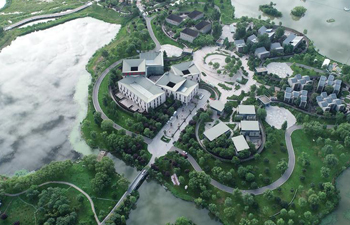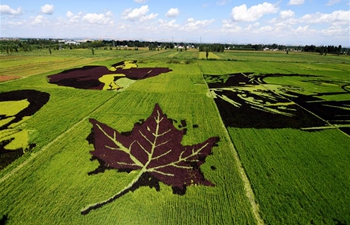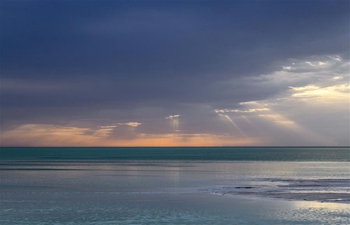
A policeman checks a woman's identity card in Biarritz, southwestern France, on Aug. 23, 2019. Biarritz, the seaside resort in southwestern France, has been transformed into a security fortress awaiting heads of state of the Group of Seven (G7) to start their summit here on Saturday. (Xinhua/Gao Jing)
Liu Fang
BIARRITZ, France, Aug. 23 (Xinhua) -- Biarritz, the seaside resort in southwestern France, has been transformed into a security fortress awaiting heads of state of the Group of Seven (G7) to start their summit here on Saturday.
Groups of paramilitary, head-to-toe in black uniforms, are seen everywhere in the town, located about 30 kilometres north of the Spanish border on the French Basque coast.
The town center is cordoned into two strictly controlled zones. The "red zone", encompassing the coastal strip -- the main venue of the talks between G7 leaders, includes the town hall and several luxury hotels. Cars are forbidden and every passer-by entering this perimeter must have a special badge and is systematically checked.
A larger "blue zone" comprises much of Biarritz's downtown. Vehicles and pedestrians carrying a badge can access its streets. Each person and every car are also stopped for check by police before entering.
Both zones are quasi-deserted as many of the town's 25,000 residents have left for holidays, partly in order to escape the summit, said Christophe, a taxi driver. "We have work with G7 while the residents have nothing to earn but suffer restrictions."
Businesses complain of the timing of the event. "Normally we should see the flood-in of tourists at this time. They are not coming because of the summit," said Justine of a local estate company.
She has a special badge for personnel working in "red zone". "With this badge, I can only get into the building in which my company is located, not to other part of the coastal strip," she complained. "It is really annoying."
The town expects some 10,000 people to attend the summit, including 6,000 delegates and 4,000 accredited journalists.
Biarritz, under spotlight of international media, is to hit headlines, at least during this weekend. "It is good that more people will know about our wonderful scenery and our delicious food," said Justine.
"And, our safe and calm life," she added, jokingly. "Now we are the most secure town in the whole world! You see all those policemen?"
In total, 13,200 police officers and gendarmes are mobilized to secure the G7 summit, with 400 firefighters on alert and 13 mobile emergency units on standby -- "vigilance maximum" in term of the French authorities.
When announcing the "extremely heavy" security deployment on Monday, French interior minister Christophe Castaner mentioned "three major threats": violent protest, terrorist attack and cyber attack.
The chief concern is to prevent violent protests. Previously, Alter-globalization activists have staged demonstrations at numerous international summits, sometimes clashing with security forces. Since last winter, France has suffered rioting and looting during the "Yellow Vest" weekly demonstrations.
Alter-globalization activists, labour unions and other left-wing groups are allowed to create their counter-summit in the towns of Hendaye (France) and Irun (Spain), which straddle the France-Spain border. They expect to draw more than 10,000 supporters during this week. Some of them vowed to stage protests in Biarritz.
Earlier this week, the "Yellow Vest" movement announced they will launch their 41st weekly protest on Saturday in Biarritz.
The French authorities ban protests in Biarritz as well as neighboring Bayonne and Anglet for the duration of the summit.
Should any violent protests take place, they will be "neutralized", warned the interior minister, adding that France had been working on "exceptional cooperation" with Spain.
